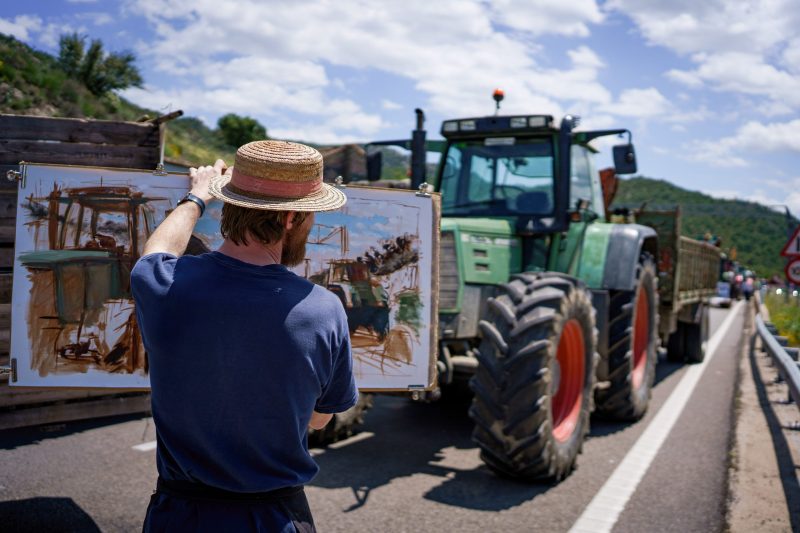Hannah Mowat is Campaigns Coordinator at Fern, an international NGO created in 1995 to keep track of the EU’s involvement in forests.
As this European Parliament term began, Fridays for Future school strikes, inspired by Greta Thunberg, were sweeping Europe, with young people demanding that political leaders act decisively against climate change’s mortal threat.
Five years on, as the parliament entered its final chapter, very different protests erupted in Brussels and across Europe – this time led by farmers, who clashed with police and brought the city to gridlock. The farmers’ grievances were many, from rising energy and fertiliser costs, to cheap imports and environmental rules.
Just as Fridays for Future signified growing pressure on politicians to tackle the climate and biodiversity crises, the farmers’ protests have been seen as a stark warning of the rural backlash against doing so.
In reality, the reasons for the farmers’ anger are more diffuse.
Climate and forests centre-stage
In the early days of the current parliament, the school strikers’ message appeared to be getting through. Tackling climate change was “this generation’s defining task”, the European Commission declared. Within 100 days of taking office, the new Commission President Ursula von der Leyen met her manifesto promise of launching the European Green Deal.
The following few years saw climate and forests take centre-stage in EU policymaking to an unprecedented degree: from the Climate Law, which wrote into the statutes the EU’s goal to be climate neutral by 2050, to the Nature Restoration Law (NRL), setting binding targets to bring back nature across Europe, and the EU Regulation on deforestation-free products (EUDR), the first legislation of its kind in the world, which aims to stop EU consumption from devastating forests around the world.
Then came the backlash.
Despite exit, EU seeks to save green reforms to energy investment treaty
Over the past year, vested industry interests and EU member states have tried to sabotage key pieces of the European Green Deal, including the NRL and the EUDR.
This pushback against laws to protect the natural world is now a battleground in EU parliamentary elections, with populist, far-right and centre-right parties seeing it as fertile vote-winning territory.
The centre-right European People’s Party, the largest group in the European Parliament, has been campaigning against key planks of the Green Deal, including the NRL, while promoting itself as the defender of rural interests.
But the views of the rural constituencies whose votes they covet are not as simplistic or polarised as widely depicted.
Deep listening
At Fern, we’ve increasingly worked with people who share the same forest policy goals but are bitterly opposed to one another.
This is why we commissioned the insight firm GlobeScan to run focus groups among rural communities in four highly forested countries: Czechia, France, Germany and Poland. We wanted to find out what those whose concerns have been used to justify the backlash against green laws really think. The results contradict the prevailing narrative.
All participants – selected with a balance of genders, occupations, political views and socio-economic statuses – felt that forests should be protected by law, and unanimously rejected the idea that such protection measures are a threat to rural economic development or an assault on property rights.
They felt deeply attached to their forests, saw them as public goods, were concerned about the state of them, and had a strong sense of responsibility and ownership towards them. They also wanted to see action to improve industrial forest management practices and mitigate climate change.
Climate, development and nature: three urgent priorities for next UK government
While there was some sympathy for concerns around too much bureaucracy, even those who expressed this view felt forests should be protected by laws. Moreover, they saw the EU as having a primary role in providing support and incentives, and developing initiatives to fight the climate and biodiversity crises.
Given how much EU politicians have put rural concerns at the heart of their arguments for rolling back the Green Deal – and are now using them in their election campaigns – it’s telling that their narratives on this do not resonate widely. Even foresters with right-leaning political views saw most of them as extreme and oversimplified.
The lesson here is that the simplistic, divisive arguments that dominate the public debate over rural people and laws to protect nature do not reflect the complex reality of peoples’ lives or their attitudes. Where a divide exists between those pushing for strong laws to protect nature and the rural communities supposedly resisting them, it’s far from irreconcilable.
Bridging any such gaps by listening and understanding each other’s perspectives is vital for all our futures. Those elected to the next EU Parliament would be wise to heed this.
For further information, see: Rural Perspectives on Forest Protection
